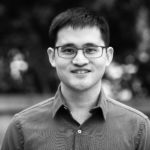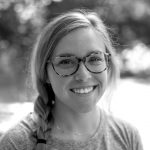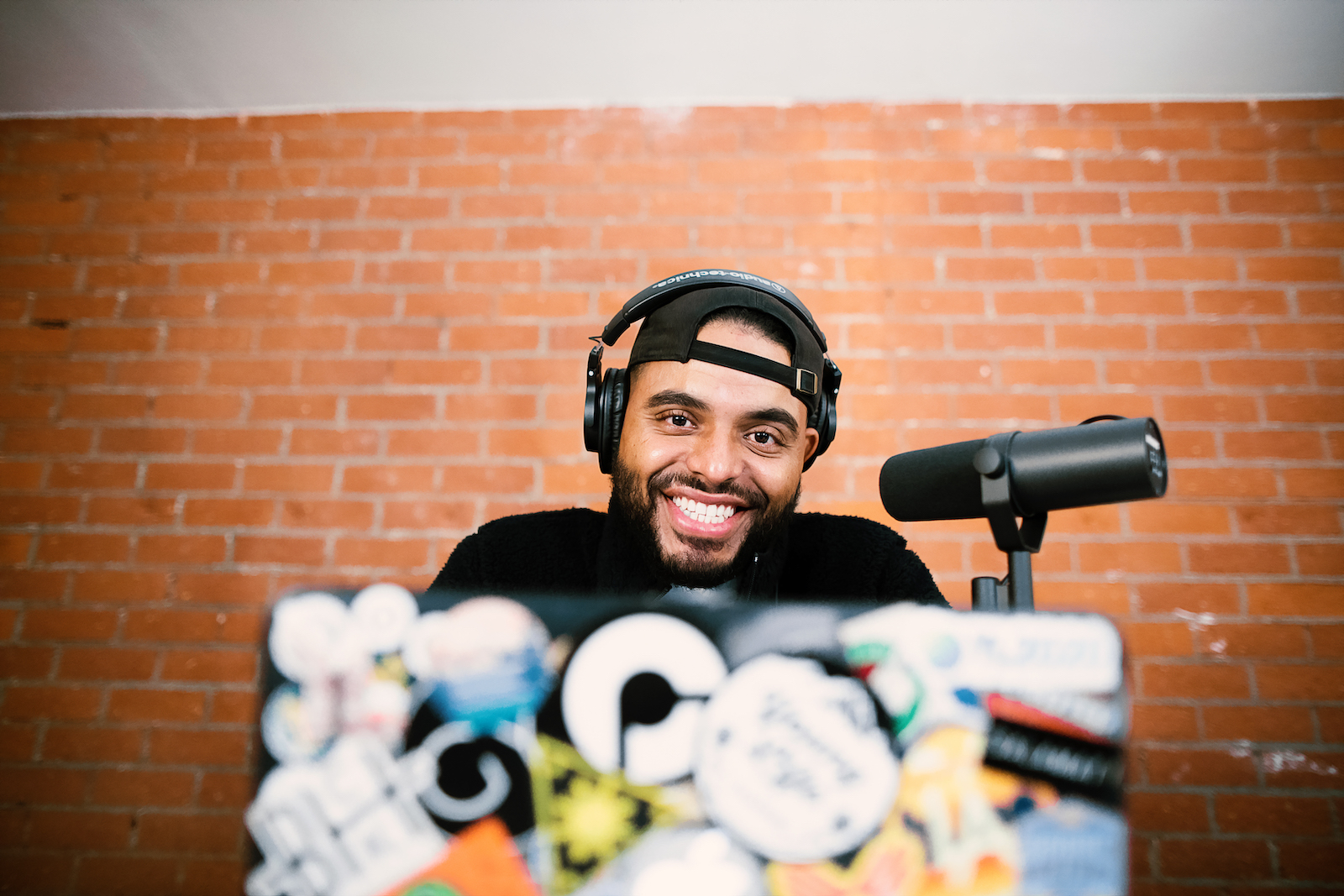
Ending otherness. that’s the simple yet bold mission of the Kinship Collective, a community started by Mark Fields (MAT ’20), with the purpose of “growing solidarity by celebrating our stories and reimagining Scripture.” The idea for the Kinship Collective came about through a book study put together by Mark’s pastor, which challenged the cohort with the question, “What is one thing, one idea, you could truly give yourself to?” Putting it another way, Mark says, “If Elon Musk is dedicating everything to putting a person on Mars, what would be your Mars?”
As Mark dwelled on the question, a word stood out in his mind: “Kinship.” He says, “It’s this idea that we are all sisters and brothers. There’s the divine spark in everybody. It’s about the dignity we all have and the family that we all already are . . . And there’s everyone’s stories also, of how they’ve come to be who they are. The particularities of our stories invite others in. There’s kinship in that.” This thinking on interconnectedness paired itself in Mark’s mind with his heart for the Scriptures. The act of delving into the Word together with others—people of all stripes and each with their unique stories—often made up most of the “moments that felt like magic” in his many years of ministry. If Mark had to choose his one thing, he knew he wanted to create a community that fostered and celebrated our universal kinship and broke down divisions between people, specifically by allowing people to share their personal stories with one another and letting those unique perspectives shed light on the Scriptures in new ways.
“One of the core things that this is about is leaning into the perspectives of others,” he says, explaining that we need each other—from every background, race, gender, socioeconomic status, and more—to grow deeper in our understanding of who God is as God is revealed in the Bible. When we hear the stories of those different from us, we gain a wider picture of truth. He says to me, “I can’t see it clearly without what you think. I can’t see fully without what my wife, Caryn, thinks, or without what my daughters think.”
When I ask Mark why this—a gathering of diverse people reading the Bible—was what bubbled up in his heart as his “Mars,” his “one thing,” he has a ready answer. He talks about his childhood and the influence of his mother.
Mark’s parents were from different backgrounds. His mother, German and English, and his father Black and Native Blackfoot. Since birth, Mark had in him a mixture of identities, a sort of reflection of different stories coming together. His parents split when he was young, however, leaving Mark with his mother. He says, “She was mom, and she was dad, and she was provider. She was all these different things, but her life was fully anchored and oriented around Christ.” Mark describes that a big aspect of his mother’s faith was shown in the way she loved others and recognized the dignity in everyone. He tells of the way she would pray over how to pay the bills while still generously buying groceries for other people, and of how she would accompany drug addicts to plasma donation centers so they could earn cash to spend on food. Mark says, “She was experienced as light.” And in their mobile home park, this showed in how she hosted a regular event she called “Bible Stories.” Mark’s mother passed flyers around, inviting kids into their home, where she taught them stories from the Bible and offered them cookies and punch. “If you memorized the Bible passage, you got 50 cents and a candy bar,” Mark says, smiling. “That’s the spiritual heritage that I was apprenticed into as a kid. I thought, This is what it looks like.”

Jerome Blanco (MDiv ’16) is editor in chief of FULLER magazine and Fuller’s senior content editor.

Katy Cook is the art director and lead designer for FULLER studio and other seminary communications. Find her work at katycook.co.
Ending otherness. that’s the simple yet bold mission of the Kinship Collective, a community started by Mark Fields (MAT ’20), with the purpose of “growing solidarity by celebrating our stories and reimagining Scripture.” The idea for the Kinship Collective came about through a book study put together by Mark’s pastor, which challenged the cohort with the question, “What is one thing, one idea, you could truly give yourself to?” Putting it another way, Mark says, “If Elon Musk is dedicating everything to putting a person on Mars, what would be your Mars?”
As Mark dwelled on the question, a word stood out in his mind: “Kinship.” He says, “It’s this idea that we are all sisters and brothers. There’s the divine spark in everybody. It’s about the dignity we all have and the family that we all already are . . . And there’s everyone’s stories also, of how they’ve come to be who they are. The particularities of our stories invite others in. There’s kinship in that.” This thinking on interconnectedness paired itself in Mark’s mind with his heart for the Scriptures. The act of delving into the Word together with others—people of all stripes and each with their unique stories—often made up most of the “moments that felt like magic” in his many years of ministry. If Mark had to choose his one thing, he knew he wanted to create a community that fostered and celebrated our universal kinship and broke down divisions between people, specifically by allowing people to share their personal stories with one another and letting those unique perspectives shed light on the Scriptures in new ways.
“One of the core things that this is about is leaning into the perspectives of others,” he says, explaining that we need each other—from every background, race, gender, socioeconomic status, and more—to grow deeper in our understanding of who God is as God is revealed in the Bible. When we hear the stories of those different from us, we gain a wider picture of truth. He says to me, “I can’t see it clearly without what you think. I can’t see fully without what my wife, Caryn, thinks, or without what my daughters think.”
When I ask Mark why this—a gathering of diverse people reading the Bible—was what bubbled up in his heart as his “Mars,” his “one thing,” he has a ready answer. He talks about his childhood and the influence of his mother.
Mark’s parents were from different backgrounds. His mother, German and English, and his father Black and Native Blackfoot. Since birth, Mark had in him a mixture of identities, a sort of reflection of different stories coming together. His parents split when he was young, however, leaving Mark with his mother. He says, “She was mom, and she was dad, and she was provider. She was all these different things, but her life was fully anchored and oriented around Christ.” Mark describes that a big aspect of his mother’s faith was shown in the way she loved others and recognized the dignity in everyone. He tells of the way she would pray over how to pay the bills while still generously buying groceries for other people, and of how she would accompany drug addicts to plasma donation centers so they could earn cash to spend on food. Mark says, “She was experienced as light.” And in their mobile home park, this showed in how she hosted a regular event she called “Bible Stories.” Mark’s mother passed flyers around, inviting kids into their home, where she taught them stories from the Bible and offered them cookies and punch. “If you memorized the Bible passage, you got 50 cents and a candy bar,” Mark says, smiling. “That’s the spiritual heritage that I was apprenticed into as a kid. I thought, This is what it looks like.”
Jerome Blanco (MDiv ’16) is editor in chief of FULLER magazine and Fuller’s senior content editor.
Katy Cook is the art director and lead designer for FULLER studio and other seminary communications. Find her work at katycook.co.


His mother’s example of faith and of loving people planted a seed in Mark that grew in him through the following decades of his life, in which he lived and worked in a very diverse range of communities and cultures. Mark went from his mobile home upbringing in Southern California’s Inland Empire to attend college in a predominantly wealthy and White part of Orange County, before serving in an after-school program for a Latino community in Santa Ana in a drastically different socioeconomic bracket, to pastoring at a Black megachurch, until he went on to other ministry contexts.
“I was bumping into realities that were so different from mine,” he says. Of his first day at his predominantly White college, he recalls, “I remember pulling up in a Lincoln Continental and bumping Snoop Dogg, or something like that. I had a Negro League baseball jersey on that was five times my size. I didn’t know what I was getting into.” Navigating through each of these seasons and traversing different cultures and contexts, he reflects on the ways his mother taught him to treat everyone with “dignity, love, and respect,” and to see the connections between people that were knit by God. Mark always believed in a sense of “togetherness,” which for him meant wanting to know deeply the stories of the people he encountered—from his classmates at college, to the teenage gang members he tutored, to the pastors he worked with.
Every new experience taught Mark something about what it looked like to live alongside people who were different from him. He also learned there is a balance required in opening ourselves up to new perspectives and celebrating the ways others can change us, while also asking “How do you stay true to you?” Remaining authentic to oneself is integral to the task of being human together. In a similar way, he explains, the concept of kinship has two necessary sides, in that we hold both values of the “universality” in our human dignity and of the “distinctness” in our one-of-a-kind stories.
Mark shares about how he naturally addresses others as “brother” or “sister,” but that at a church he worked at, a colleague asked that he not call her “sister.” Mark says, “I don’t want to treat people in a way that doesn’t feel respectful or loving. But that was a challenging moment for me, and I had to learn how to still express family without using the language that bothered her.” Mark knows that it isn’t easy for humans to come together, as simple as the idea is in theory. Encounters with one another can be marked with discomfort, but he says they are “always an invitation to maturity, and always an invitation to reflection.”


When Mark arrived at Fuller as a student, he’d already had years of ministry under his belt. But he found Fuller to be influential in that it was a “convening place.” “I relished Fuller’s ability to stretch me. I met all sorts of different people, and that transformed me.” This was true for those Mark encountered in person and on the page. Mark describes Fuller as a place that didn’t “spoon-feed” him theology but exposed him to different traditions and voices that represented a broad range of perspectives across times and places. In this way, Fuller became one of the gifts on his journey that helped him better understand how kinship was interwoven with the task of reimagining Scripture.
Mark dreams for The Kinship Collective to be an influential example of what a communal imagination of Scripture looks like. But for now, the pandemic has led him to begin this work in digital spaces. The Kinship Collective’s first expression has been a podcast of the same name, started in the summer of 2020. Mark invites guests to share their personal stories, their backgrounds, and their areas of expertise before they dive together into a passage of Scripture—the conversations acting as a unique lens by which to read and imagine the Bible in a fresh way. For example, in one episode, Mark invited pastor and community organizer Eric Johnson to speak about Black history before they delved into Genesis 1:26–27, which says “God created humankind in God’s image.” Worth It author Brit Barron spoke on another episode about the “challenges of real diversity” and “what it looks like to invite people to the middle ground,” as they considered Matthew 7:1–5, which includes the command, “Do not judge, or you too will be judged.” And Pastor Dean Choi shared with Mark about racial trauma and love languages, as the two examined Levitical laws on how we ought to treat our neighbor.
Each episode of The Kinship Collective podcast kicks off with a few bars of a cover of “We Are Family,” the upbeat tune originally by Sister Sledge. Mark introduces his guests, putting on a hearty voice, like a sports announcer’s or a movie trailer voice over, which usually elicits a laugh. The warmth between him and his conversation partners is immediately apparent and spans the length of the interviews. And a sincere joy in Mark is evident as he listens to his guests, particularly when they share a view on a biblical passage that makes it come anew to him. At the end of one episode, Mark signs off with a heartfelt word: “All these conversations center around the fact that your story matters. No matter where you find yourself . . . you have to know that you are deeply loved and deeply worth it.”
This message and mission of kinship is one Mark is committed to. And while ending otherness may sometimes seem as lofty a goal as landing a person on Mars, Mark believes we can get there, together.
As she leans into her own identities as a psychologist, a Christian, and a Black woman, Christin Fort serves communities at the overlapping intersections of faith, research, and identity